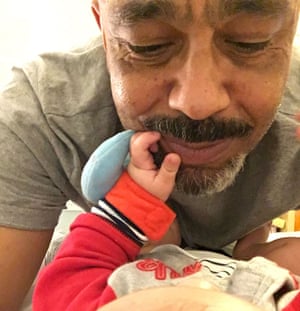I never thought I would become a father. I grew up in care and as far back as I can remember I had issues with my sexuality. By the time I was in my 20s I had accepted that I was gay, even though I’d had a couple of heterosexual flings. Over the years, through my work as a mentor and as a foster carer, I met a number of youngsters whom I took care of and some of whom called me Dad. But I’d always wanted to have my own child too.
I met the mother of my child through work. I was delivering health and well-being workshops, and she wanted to talk about the possibility of fostering. We became friends: unbeknown to me pretty early on she decided that I was the ideal candidate to father her child. P was a heterosexual, professional woman in her early 30s. She had always wanted to have a child with a gay man – and someone who really wanted to be a father.
We went ahead without professional advice, gleaning what we could from the internet. For the initial few attempts I produced sperm in east London and took it over to west London. Soon we decided it was best to be in the same place. It was embarrassing to do this in someone else’s home but she blasted a TV programme while I got on with it, which helped. Then a simple syringe was used to insert the sperm.
It took only two attempts like this before we conceived. I remember exactly where I was when I got the news. I was driving, and picked up my phone on hands-free when P told me to pull over. She was pregnant. Sadly, at the 12-week scan we discovered the baby had died. This was one of the saddest days I’d had – to get this far, and for it to end so suddenly. I was comforted by friends who’d had miscarriages and I did consider that maybe it wasn’t to be. The miscarriage wasn’t straightforward, and all I could do was empathise with P. She decided she wanted to try again as soon as possible so we did, and the second attempt was successful.
After the miscarriage it was difficult to accept we were pregnant and there was a lot of worry all the way through the pregnancy. Pregnancy can be an odd thing for men to get their heads around, and it was even stranger for me as I was not in a relationship with the mother. I didn’t see her every day and it was hard for me to be emotionally supportive just through the odd phone call and weekly meet-up.

We did have a minor hiccup during pregnancy where we spent a few days not talking. It was my fault: I was angry about some of the pregnancy purchases and treatments, which I thought were unnecessary and costly. P suggested counselling, so we went to eight sessions, learning how to express our concerns, how to listen to really hear each other and say what we mean.
But none of this really felt real to me until the day my son was placed on to my bare chest by his mother’s birthing partner. I was unable to be in the room during the birth as had been arranged in advance. P was supported by her friend who acted as her birthing partner and had three children of her own. Yes, I felt guilty and lots of my mates who were fathers told me how amazing it was to be present. But I am extremely squeamish and hate blood, pain and hearing people struggle. As it happened, our son was eventually delivered by caesarean section so P was in surgery while I spent my first moments with this child we had made.
It was such an emotional experience for me that I couldn’t stop crying. I was crying for the younger me who was abandoned by my parents into the care system; I was crying for every time I was rejected by foster parents as a child needing a family home; I was crying for all the young people I know who had failed because of a lack of love in their lives. Thankfully, P understood and allowed me to just sit with our little man with tears streaming down my face. These were good tears, healing tears. It felt like my brain was rewiring to allow me to love my son unconditionally.
As I sat alone with my son, this brand new little life in my arms, my life changed. That’s why I cried. I thought about whether I had loved anyone unconditionally before him and the answer was no. I’d never felt like this about anyone before – even myself. I felt an overwhelming sense that this person needed me and will love me back if I do things correctly.
I used to have a cavalier attitude to life. I’d let my career slip as I wasn’t that bothered about taking care of myself after my father died. Now I had someone to work for, someone to impress, someone to think about all the time. After all the rejection and hurt of my past, through my son I finally felt like I had a family of my own.
A moment that changed me: holding the newborn baby I never thought I’d have | David Akinsanya